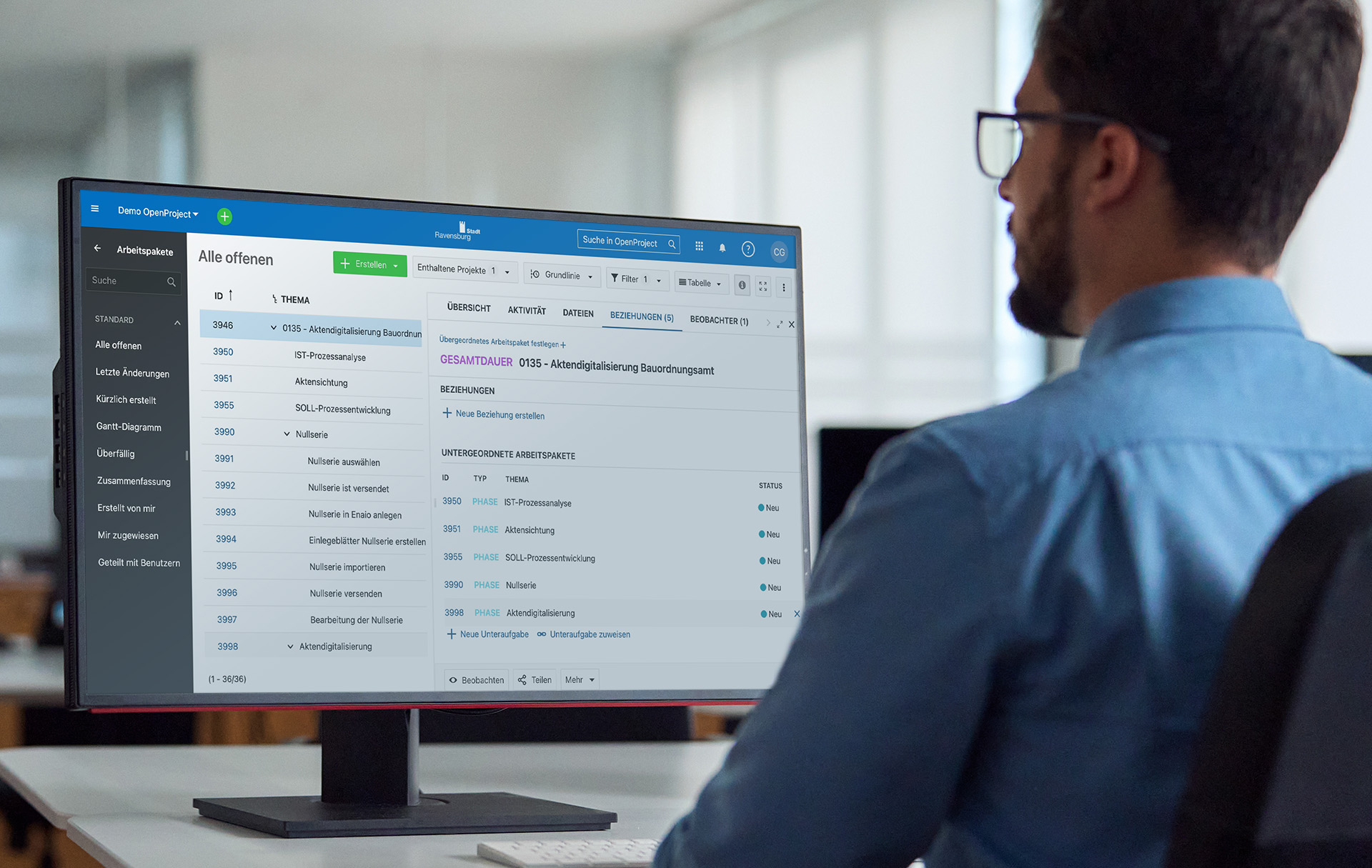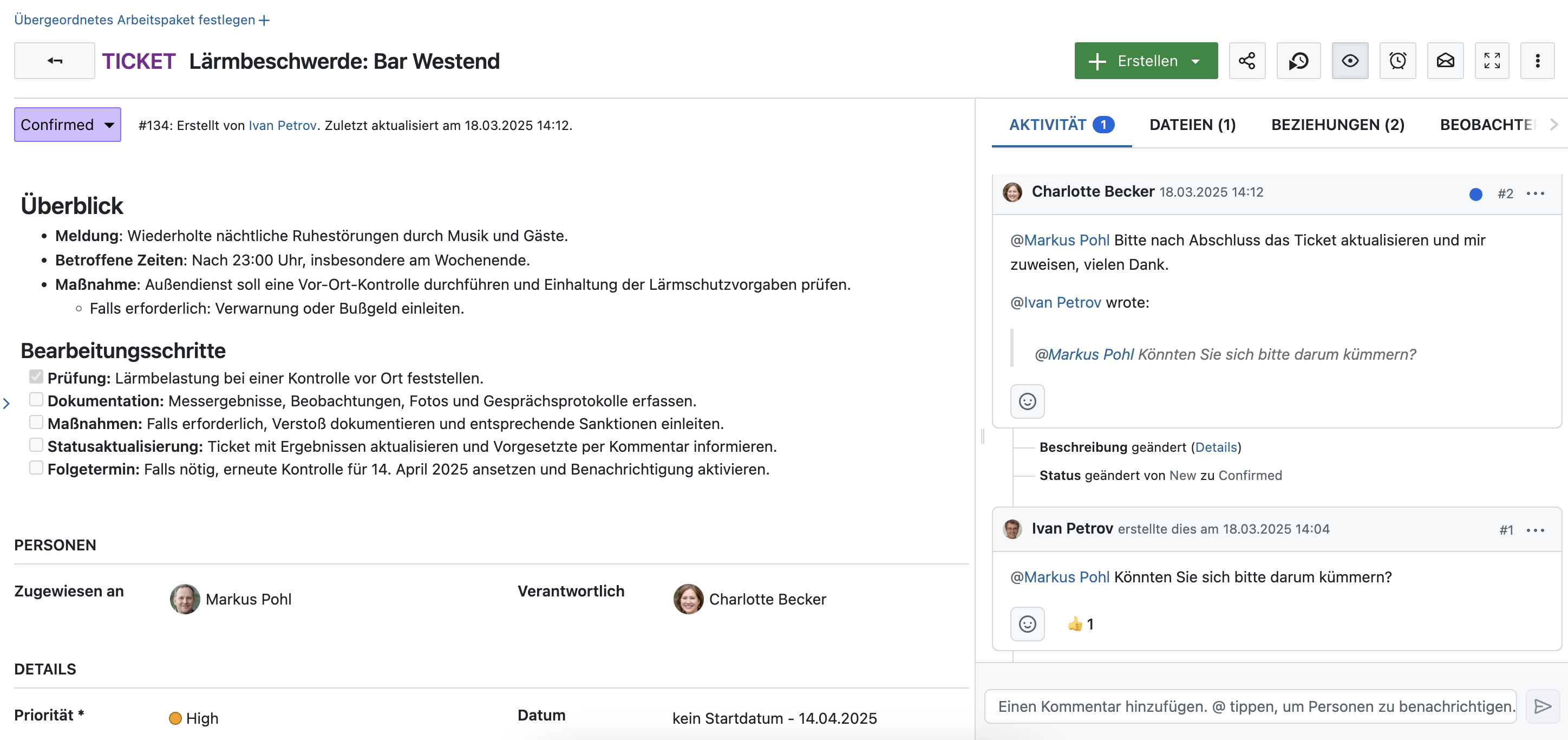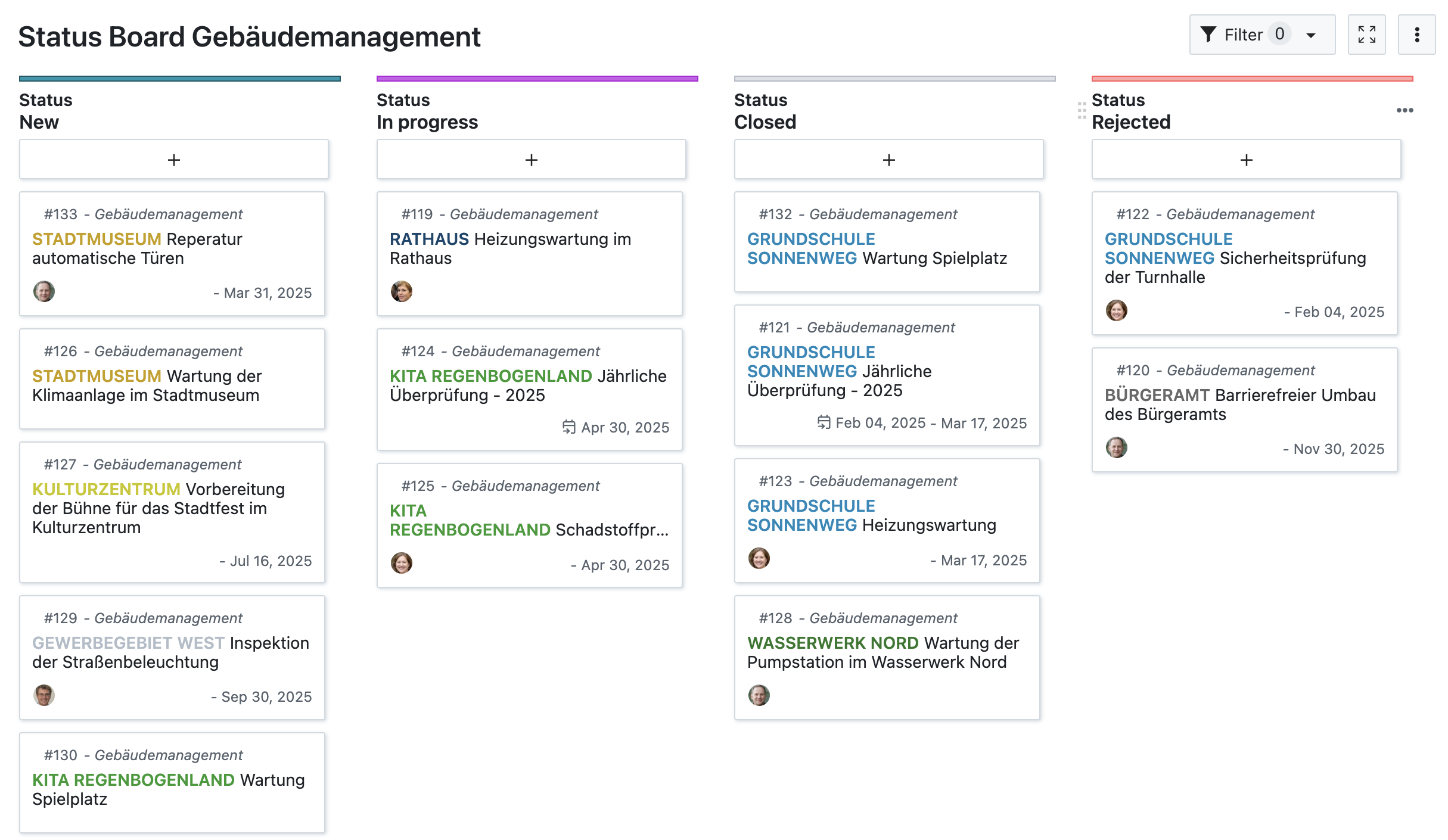
Best practice: Efficient ticket management for municipal administrations
How do cities and municipalities keep track of internal tasks, complaints, and maintenance requests? Without a structured solution, delays, unclear responsibilities, and high coordination efforts arise. OpenProject provides a digital ticket management solution for municipalities that simplifies processes and increases transparency. Read this article to learn how to use OpenProject as ticket management, on the example of a German city administration.
Why digital ticket management is essential for public administration
Digital ticket management is more than just processing inquiries. Many municipalities still record daily tasks and internal reports via email, phone, or Excel spreadsheets — often with unclear responsibilities and long processing times.
Every day, cities and municipalities must coordinate numerous inquiries, complaints, and tasks:
- Citizens report issues such as noise disturbances or illegal waste disposal.
- Public buildings need maintenance and management.
- Public order services coordinate operations within the city.
Yet, many municipalities still lack a structured solution for internally recording, processing, and assigning these tasks. Instead, they rely on emails, Excel sheets, or even paper notes — leading to high coordination efforts, unclear responsibilities, and delays.
What happens internally to these tickets once they are created? How can it be ensured that they are efficiently assigned to the right personnel with the necessary capacity and expertise? And how do we ensure that all essential information is included?
OpenProject: More than just project management
A digital ticket management system like OpenProject solves exactly this problem. Employees can record tasks in a structured manner, assign them directly to the right people, and track progress — efficiently, transparently, and without complex IT integration.
OpenProject is more than a traditional project management tool — and also more than a classic ticketing system. The software combines both approaches in a way that suits the users’ needs. While typical ticketing systems are mostly designed for external requests, OpenProject focuses on internal organization and processing of tasks.
This makes OpenProject an ideal solution for municipalities to manage daily administrative tasks and internal processes more efficiently — whether for citizen inquiries, building maintenance, or deployment planning:
- Flexible configuration: Custom workflows tailored to different municipal departments.
- Structured recording: Tickets contain all relevant information from the start.
- Transparent processing: All stakeholders can track status and next steps.
- No media disruption: Communication and documentation happen directly in the system — without email clutter or files like “Ticket-2338-in-progress-2”.
Due to its high configurability, OpenProject allows great flexibility for users.
Best practice: How a city administration uses OpenProject for digital ticket management
To illustrate how this works in practice, let’s look at an example: Think of a typical German city administration that handles inquiries via emails, phone calls, and Excel spreadsheets. As this is a time-consuming and error-prone process, the city wants to introduce digital ticket management and decided to use OpenProject.
The city administration now centrally uses OpenProject for ticket management — from complaints in the public order office to building maintenance. With OpenProject as its central ticket management platform, the city administration is now able to:
- Record and prioritize complaints and inquiries centrally.
- Clearly define responsibilities and deadlines.
- Track the processing status in real-time.
- Work more efficiently and transparently.
Now, let’s dive deeper into the praxis and look at two concrete practical examples: How does this German city use ticket management in the area of public order services and in building management?
Use case: Ticket management for public order services
The public order office of our example city uses OpenProject to manage daily operations and complaints efficiently:
- Incoming complaints (e.g., noise disturbances, illegal parking, waste issues) are recorded as tickets and automatically assigned to the responsible staff.
- Task scheduling is managed through an agile board with priorities and deadlines.
- Employees document progress in real-time, including evidence or notes directly in the ticket.
- Citizen inquiries are handled faster and more transparently.
The advantage of OpenProject as a digital ticket system for public order services: Less coordination effort, faster processing, and transparent tracking.
Example: Managing a noise complaint with OpenProject
Here’s how a noise complaint could be processed using OpenProject:
- A citizen reports repeated nighttime noise disturbances from a bar.
- A public order officer logs the complaint as a work package of type ‘Ticket’ in OpenProject.
- The department head prioritizes the case and assigns the work package to an on-site inspector.
- The inspector conducts an on-site check and documents the findings within the ticket.
- The status is updated to ‘Resolved’, with additional details added to the ticket’s activity log. The department head, tagged in the entry, automatically receives a notification.
- If necessary, the bar is informed and a follow-up inspection is planned — a new work package is created, with a date and automatic reminder for a review in a few weeks.
Here’s how such a noise complaint ticket could look like in OpenProject:

Image: A work package in OpenProject, type ticket, named ‘Lärmbeschwerde: Bar Westend’, with discussions in the Activity tab, priority high and a set end date.
Use case: Ticket management for building maintenance
A municipal administration has to manage and maintain many buildings. This is another great example on how to use OpenProject as digital ticket management software:
Each maintenance request or issue is logged as a ticket and assigned to the responsible team. Automated reminders ensure that regular inspections and maintenance are carried out on time. Priority repairs (e.g., defective heating in winter) can be handled immediately. The administration maintains a complete record of all completed actions. And all data, communication and information is centralized in the ticket.
The advantage of OpenProject as a digital ticket system for facility management: Structured maintenance planning, no overlooked tasks, and better resource allocation.
The city administration can configure OpenProject so that each building is represented via work package types, subdivided by building category. All tasks for these buildings - from repairs to regular inspections - are created directly in the system as associated subtasks and assigned to the responsible team members for processing. No need to search through lists or Excel sheets. And, of course, automated reminders – in-app and/or per email – prevent forgotten maintenance tasks.
An example of a simple agile status board with tickets in OpenProject could look like this:

Image: An agile status board with tickets of types like ‘Stadtmuseum’ or ‘Kita Regenbogenland’, sorted by status.
Example: Managing a heating repair in an elementary school
Here’s how a heating repair could be handled in OpenProject:
- The facility management team logs the issue as a work package of type ‘Ticket’ and adds the school name as a custom field of type ‘Building’.
- The responsible janitor, added as an external person, receives a notification.
- The repair is documented within the ticket, including photos and notes.
- Once completed, the ticket is closed and serves as a permanent record.
Why OpenProject is the ideal ticket management solution for public administrations
There are many software options for task and ticket management. With its open source approach and hosting in Europe, OpenProject is an excellent choice for European municipalities and government agencies.
Why OpenProject is the ideal ticket management solution for the public sector:
- Easy implementation and no complex IT integration.
- Open source and GDPR-compliant — developed for European administrations.
- Choice between secure cloud solutions or self-hosting.
- Flexible customization — from facility management to public order offices.
- Open source and independent — no vendor lock-in with U.S.-based providers.
- Part of openDesk — the digital workplace solution for public institutions.
Learn more about OpenProject for the public sector, including more best practices and case studies.


